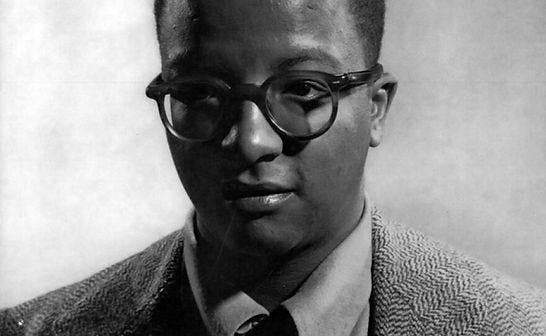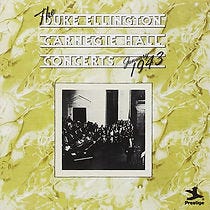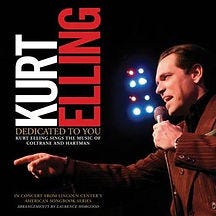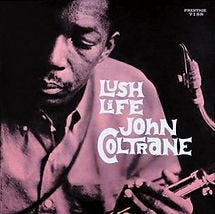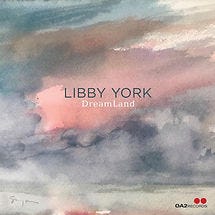ALO5: Ballads III: "Lush Life"
A List of Five
Duke Ellington's alter ego was William Thomas "Billy" Strayhorn. He was the composer responsible for the Ellington staples, "Take the 'A' Train", "Chelsea Bridge", "A Flower Is a Lovesome Thing", and "Lush Life."The latter of these songs was composed between 1933 and 1936 and first performed by vocalist Kay Davis, appearing with the Duke Ellington Orchestra at Carnegie Hall on November 13, 1943. Strayhorn was a young man when he began the song, which was to become his signature composition.
"Lush Life" was written in the key of D-flat major. The melody occurs over relatively complex chord changes when compared with many jazz standards. Strayhorn's chromatic movement and navigation of the piece evoke a dreamlike state and the dissolute spirit characteristic of the "lush life." Strayhorn's lyrics are something well beyond a teenage composer working in a local pharmacy in the Pittsburgh 1930s:
I used to visit all the very gay places
Those come-what-may places
Where one relaxes on the axis
Of the wheel of life
To get the feel of life
From jazz and cocktails
The gals (girls) I knew had sad and sullen gray faces
With distingué traces
That used to be there
You could see where
They'd been washed away
By too many through the day
Twelve o'clock tales
Then you came along
With your siren song
To tempt me to madness
I thought for a while
That your poignant smile
Was tinged with the sadness
Of a great love for me
I guess (Ah, yes,) I was wrong
Again, I was wrong
Life is lonely again
And only last year everything seemed so sure
Now life is awful again
A troughful of hearts could only be a bore
If "Ballad" needed an example included in its definition, it would be "Lush Life"
Duke Ellington Orchestra, featuring Kay Davis
The Duke Ellington Carnegie Hall Concerts, January 1943
Prestige Records
1958
Ellington loved Billy Strayhorn. Ellington notes that the song was written when Strayhorn was 16 years old when he began composing the song. This is an emotional depth that completely escapes any music composed on an Apple Ipad sitting in the bathroom of....you chose, a penthouse, ghetto, or country shack...this writing is timeless. Sepia-toned and emotive, Davis captures the spirit of the piece this first time out, but this song will be improved on, just as the music benefited from better technology. What it takes to sing this song is experience and Davis did not have this when she performed this in the early post-War years.
Nat King Cole
Pete Rugolo Orchestra
Capitol Records
1949
A perfect vehicle for the young Nat King Cole, with Pete Rulolo conducting his orchestra. While Cole is a perfect voice for this ballad, he still lacks the world-weariness necessary to sing this song. This is a song that should be reserved for interpretation late in an artist's career. Once a scribe noted that Standards could only be performed well by those artists who have lived the lyrics. While King Cole would have had his challenges, he was on the upswing at the beginning of his professional career when he performed this. Like Beethoven and Karajan, it would take time for a performer to appear deserving of the song.
Kurt Elling
Dedicated to You: Kurt Elling Sings the Music of Coltrane and Hartman
Concord Records
2009
Completely over-the-top, but Elling is the premiere male vocalist after the late Mark Murphy. Here, Elling pays tribute to John Coltrane and Johnny Hartmann whose John Coltrane and Johnny Hartman (Impulse!, 1963) is beyond compare. Elling may not have the street cred but he does have the chops to transform this standard into something other than it is. Elling's homage is not hero worship, he is well beyond that. Like Murphy, he is an artist, an interpreter, and a stylist who transforms his material through the sheer will of his talent. This is a modern interpretation that shows what jazz can and should do - that is transform into something greater. That said, we are still looking for the right voice for the song.
John Coltrane
Lush Life
Prestige Records
1961
John Coltrane never had a "pretty" tone and when I have said this in the past, I have enjoyed a beautiful attack for what a Philistine I am for noting this and the fact that at the end of his career, Coltrane was the most boring genius recording. That being said, he was perfectly capable of delivering breath-taking performances as he did in the 13-plus minutes he delivered with pianist Red Garland, bassist Paul Chambers, and drummer Art Taylor in Rudy van Gelder's Hackensack studio on January 10, 1958. Coltrane had already delivered for Miles Davis in this first great quintet (with drummer Philly Joe Jones) with whom he would enter Columbia Studios a month later to record Milestones (Columbia, 1958). Here we are just short of Cotrane getting ready to take off into what he would create until his early death nine years later.
Libby York
"Something Cool"
Dreamland
OA2 Records
2023
No, this is not the right song at all. But, it is the right interpreter. Libby York delivered a definitive performance of Billy Barnes' "Something Cool" on her Dreamland recording, Barnes' song can easily be thought of as a prelude to Strayhorn's masterpiece. York captured so vividly the fatigue and malaise of a disappointed life in Barnes' song that she must record Strayhorn's song to make perfect bookends.



